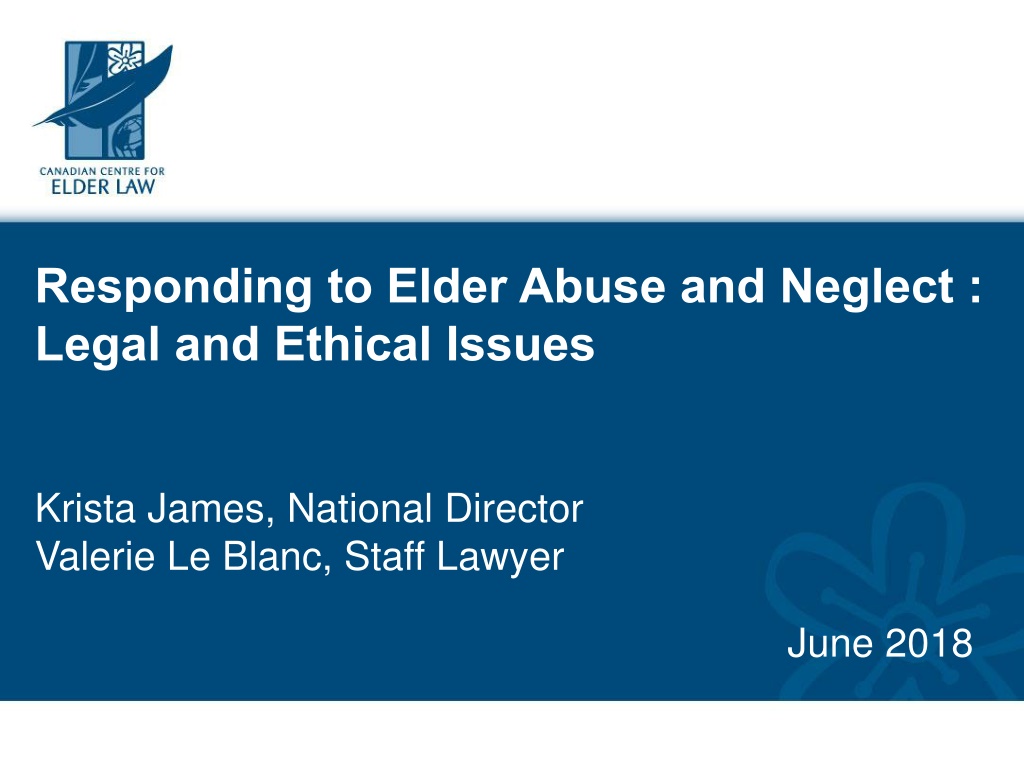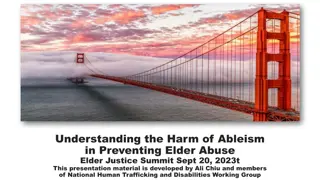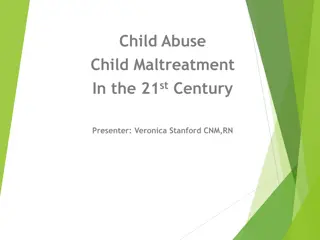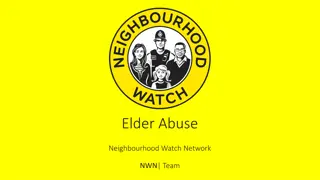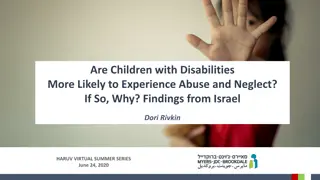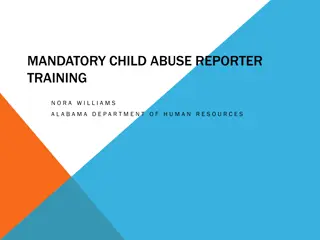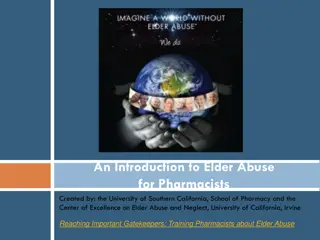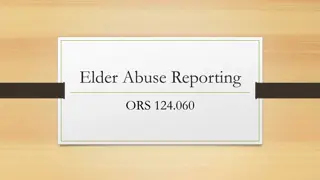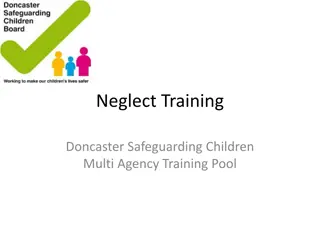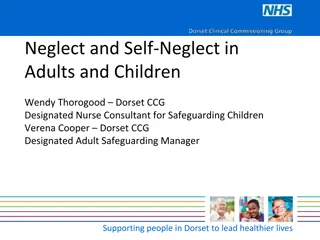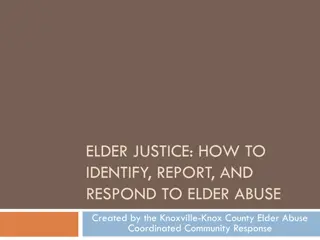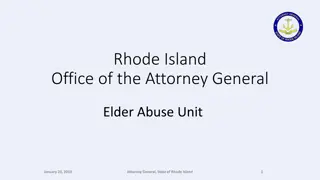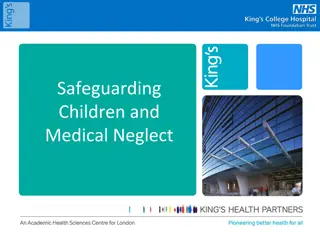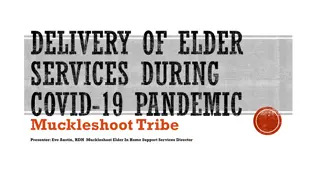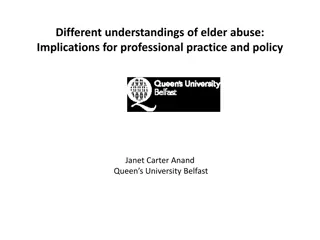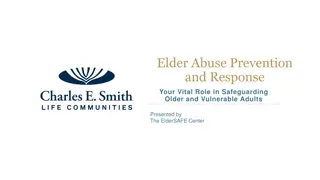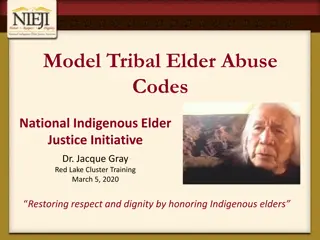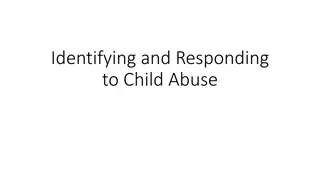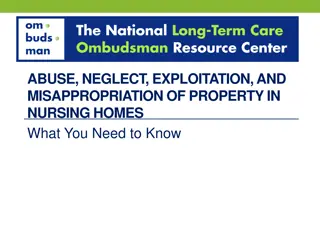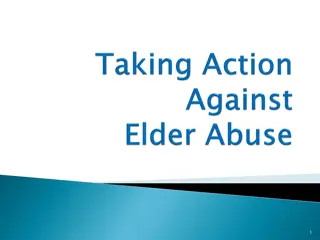Understanding and Addressing Elder Abuse and Neglect: Legal and Ethical Perspectives
Explore legal and ethical considerations related to elder abuse and neglect in Canada, presented by Krista James and Valerie Le Blanc from the Canadian Centre for Elder Law. Discover definitions, laws, and resources to combat mistreatment of older adults, including insights on various types of abuse and neglect. Dive into past and current projects aimed at supporting vulnerable individuals and promoting awareness.
Download Presentation

Please find below an Image/Link to download the presentation.
The content on the website is provided AS IS for your information and personal use only. It may not be sold, licensed, or shared on other websites without obtaining consent from the author. Download presentation by click this link. If you encounter any issues during the download, it is possible that the publisher has removed the file from their server.
E N D
Presentation Transcript
Responding to Elder Abuse and Neglect : Legal and Ethical Issues Krista James, National Director Valerie Le Blanc, Staff Lawyer June 2018
Canadian Centre for Elder Law 1. Legal research 2. Law reform 3. Legal education 4. Outreach 1
CURRENT PROJECTS A Practical Guide to Elder Abuse and Neglect Law in Canada: Update Inclusive Investing: Respecting the Rights of Vulnerable Investors through Supported Decision Making Older Women s Dialogue Project 2
SAMPLE OF PAST PROJECTS Promising Practices in Housing Older Women Fleeing Abuse (11 practices) Power of Attorney Elder Abuse Awareness Project (brochures) Counterpoint project (videos and fact sheets) 3
Presentation outline 1. What is elder abuse and neglect? 2. Relevant laws in Canada 3. Ethical principles 4. Resources 4
Disclaimer This presentation is not legal advice 5
WHAT IS ELDER ABUSE? Elder abuse refers to the deliberate mistreatment of older adults Includes actions and/or behaviour, or lack of action or behaviour Physical, mental, emotional, financial, sexual harm or loss 6
WHAT IS NEGLECT? Failure to provide necessary care, assistance, or attention to an adult Passive = Unintentional Active = Intentional 7
WHO ABUSES AND NEGLECTS OLDER ADULTS? Strangers Con artists Relationships of trust 8
SAMPLE DEFINITION OF ABUSE The deliberate mistreatment of an adult that causes the adult (a) physical, mental or emotional harm, or (b) damage or loss in respect of the adult's financial affairs, and includes intimidation, humiliation, physical assault, sexual assault, overmedication, withholding needed medication, censoring mail, invasion or denial of privacy or denial of access to visitors Adult Guardianship Act, RSBC 1996, c 6, s 1 9
SAMPLE DEFINITION OF ABUSE "abuse" means the deliberate mistreatment of an adult who lacks the capacity to protect himself or herself that causes or is reasonably likely, within a short period of time, to cause the adult (i) serious physical, psychological or emotional harm, or (ii) substantial damage to or substantial loss of assets and includes intimidation, humiliation and sexual assault; Adult Protection Act, SNL 2011, c A-4.01 10
SAMPLE DEFINITION OF ABUSE: ONTARIO emotional abuse means, (a) any threatening, insulting, intimidating or humiliating gestures, actions, behaviour or remarks, including imposed social isolation, shunning, ignoring, lack of acknowledgement or infantilization that are performed by anyone other than a resident, or (b) any threatening or intimidating gestures, actions, behaviour or remarks by a resident that causes alarm or fear to another resident where the resident performing the gestures, actions, behaviour or remarks understands and appreciates their consequences; ( mauvais traitement d ordre affectif ) 11
SAMPLE DEFINITION OF NEGLECT: neglect means a lack of or failure to provide necessary care, aid, guidance or attention which causes or is reasonably likely to cause the victim severe physical or psychological harm or significant material loss to his estate Adult Protection Act, RSPEI 1988, c A-5, s 1 12
SAMPLE DEFINITION OF NEGLECT: any failure to provide necessary care, assistance, guidance or attention to an adult that causes, or is reasonably likely to cause within a short period of time, the adult serious physical, mental or emotional harm or substantial damage or loss in respect of the adult's financial affairs, and includes self neglect Adult Guardianship Act, RSBC 1996, c 6, s 1 13
FEDERAL: CRIMINAL CODE OF CANADA, Is elder abuse or neglect a crime? Some actions can be a crime Almost all crimes are age neutral Police will sometimes respond to elder abuse 14
CRIMINAL CODE: PHYSICAL ABUSE Murder (s 229) Assault (s 265) With a weapon or causing bodily harm (s 267) Aggravated assault (s 268) Forcible confinement or imprisonment (s 279) 15
CRIMINAL CODE: NEGLECT Failure to provide necessities of life (s 215) Criminal negligence (s 219) Manslaughter (abuse or neglect causes unintentional death) (s 234) 16
CRIMINAL CODE: SEXUAL ABUSE Incest (s 155) Sexual assault (s 271) With a weapon, threats to a third party or causing bodily harm (s 272) Aggravated sexual assault (s 273) 17
CRIMINAL CODE: PSYCHOLOGICAL/EMOTIONAL ABUSE Uttering threats (s 264.1) Intimidation (s 423) 18
CRIMINAL CODE: FINANCIAL ABUSE Theft (s 322) Theft by a person holding a POA (s 331) Misappropriation of money held under direction (s 332) Criminal breach of trust (s 336) Theft, forgery, etc. of a credit card (s 342) Robbery (s 343; 344) 19
CRIMINAL AND NON-CRIMINAL FORMS OF ELDER ABUSE Non-criminal Criminal isolation ignoring the older adult mental cruelty neglect (non-criminal) humiliation ridicule insults frightening the older adult infantilizing the older adult assault (intentional application of force, directly or indirectly, without consent, including sexual assault) criminal negligence (failure to provide the necessaries of life) stalking, harassing, intimidating or threatening the adult murder or manslaughter forcible confinement theft, fraud, forgery or extortion 20
FEDERAL: CRIMINAL CODE SENTENCING a sentence should be increased or reduced to account for any relevant aggravating or mitigating circumstances (i) evidence that the offence was motivated by bias, prejudice or hate based on race, national or ethnic origin, language, colour, religion, sex, age, mental or physical disability, sexual orientation, or gender identity or expression, or on any other similar factor, 21
FEDERAL: PROTECTING CANADAS SENIORS ACT Protecting Canada s Seniors Act, SC 2012, c 29, s 2. Amended the Criminal Code to add s. 718.2(1a)(iii.1): evidence that the offence had a significant impact on the victim, considering their age and other personal circumstances, including their health and financial situation 22
ELDER ABUSE LAWS ACROSS THE COUNTRY Each province and territory has taken a unique approach to developing: Laws to address abuse of vulnerable adults Public agencies with a mandate to support adults who experience abuse 23
ELDER ABUSE LAWS ACROSS THE COUNTRY Adult guardianship/protection legislation Domestic violence legislation Care facility legislation Public guardian and trustee laws Unique approaches 24
ADULT PROTECTION/GUARDIANSHIP LEGISLATION Response to abuse/neglect of vulnerable adults Can report abuse to agency designated in the law British Columbia, Nova Scotia, Prince Edward Island, Yukon, and Newfoundland and Labrador 25
DOMESTIC/FAMILY VIOLENCE LEGISLATION Although designed to address spousal violence, can be applied to elder abuse Provide emergency court powers, eg: protection orders warrants Adult would need assistance to get legal advice and possible can get legal aid 26
PROTECTION FOR PERSONS IN CARE LEGISLATION Creates a requirement for care facilities to respond to abuse occurring in the facility Grounded in an understanding that people living in care facilities are particularly vulnerable 27
PUBLIC GUARDIAN AND TRUSTEE LEGISLATION Powers to intervene in circumstances of financial abuse or abuse by a power of attorney, trustee or guardian Example = power to freeze assets Powers vary significantly across the country 28
UNIQUE APPROACHES Quebec: Human rights law permits human rights agency to respond to exploitation of older adults Manitoba: Vulnerable Persons Living with a Mental Disability Act 29
RESPONDING TO ABUSE AND NEGLECT Consider urgency: 1. Is the adult in danger of harm? 2. Will money be stolen or spent? Property taken away? 3. Does the adult appear to lack mental capacity? 30
RESPONDING TO ABUSE AND NEGLECT: REPORT TO POLICE How to report? Emergency: Call 911 Local Police (non-emergency): Province/Territory specific numbers Why report? Suspect a crime has/may occur, or immediate risk to a person s physical safety 31
RESPONDING TO ABUSE AND NEGLECT: MANDATORY DUTY TO REPORT LEGISLATION Care facilities (Alberta, Manitoba, Newfoundland and Labrador, Nova Scotia, Ontario) if you work in a care facility you must report abuse to supervisor Reporting abuse is mandatory in Nova Scotia if occurring anywhere in community 32
IS RESPONDING TO ABUSE MANDATORY? Consider not only the law. Consider also: Employer or institutional policies Professional codes of ethics 33
RESPONDING TO ABUSE AND NEGLECT: AGENCIES THAT RESPOND TO ABUSE Alberta: Protection for Persons in Care Office British Columbia: Regional health authorities, Providence Health Care Society, and Community Living BC Manitoba: Ministry of Health, Protection for Persons in Care Office New Brunswick: Minister of Family & Community Services Newfoundland & Labrador: Provincial director of Neglected Adults Ministry of Health and Community Services 34
RESPONDING TO ABUSE AND NEGLECT: HEALTH AUTHORITY/DESIGNATED AGENCIES Nova Scotia: Minister of Community Services; Minister of Health Ontario: Director (Ministry of Health) Prince Edward Island: Minister of Health and Wellness (Adult Protection Program) Quebec: Commission des droits de la personne et des droits de la jeunesse. Saskatchewan: Department of Health and regional health authority Yukon: Seniors Services/Adult Protection Unit 35
Guiding Principles Responding to Abuse 1. Talk to the older adult Ask questions. Talk to the older person about his or her experience. Help the person to identify resources that could be helpful. 36
Guiding Principles Responding to Abuse 2. Respect personal values Respect the personal values, priorities, goals and lifestyle choices of an older adult. Identify support networks and solutions that suit the older adult s individuality. 37
Guiding Principles Responding to Abuse 3. Recognize the right to make decisions Mentally capable older adults have the right to make decisions, including choices others might consider risky or unwise. 38
Guiding Principles Responding to Abuse 4. Seek consent or permission In most situations, you should get consent from an older adult before taking action. 39
Guiding Principles Responding to Abuse 5. Respect confidentiality and privacy rights Get consent before sharing another person s private information, including confidential personal or health information. 40
Guiding Principles Responding to Abuse 6. Avoid ageism Prevent ageist assumptions or discriminatory thinking based on age from affecting your judgment. Avoid stereotypes about older people and show respect for the inherent dignity of all human beings, regardless of age. 41
Guiding Principles Responding to Abuse 7. Recognize the value of independence and autonomy Where this is consistent with the adult s wishes, assist the adult to identify the least intrusive way to access support or assistance. 42
Guiding Principles Responding to Abuse 8. Develop a trauma-informed practice Learning how to support people who have experienced trauma will enhance your practice 43
Guiding Principles Responding to Abuse 9. Consider Indigenous experiences Indigenous experience often includes distrust of supposedly helpful agencies due to experiences of racism and colonization, including residential schools and foster homes. 44
Guiding Principles Responding to Abuse 10. Apply a holistic lens Aim to consider older people in a holistic manner in order to work to identify the most helpful and acceptable services of support. 45
LIST OF RESOURCES: LEGISLATION Criminal Code of Canada laws-lois.justice.gc.ca/eng/acts/C-46/ Legislative Assembly (provincial/territorial) CanLii Provincial/Territorial and Federal court websites Law libraries 46
LIST OF RESOURCES: RESPONDING TO ABUSE & NEGLECT IN YOUR REGION Canadian Network for the Prevention of Elder Abuse (Get Help page) https://cnpea.ca/en/what-is-elder-abuse/get-help 47
REVIEW The appropriate response depends on: Where is abuse occurring? Does the older person have the capacity to take action on her own? What is the degree of urgency? What matters most to the older person? 48
REVIEW In most situations: Reporting abuse is not mandatory Supporting a person who is experiencing abuse is usually a process takes time and trust What happens will depend on the helpful resources are available in your community 49
